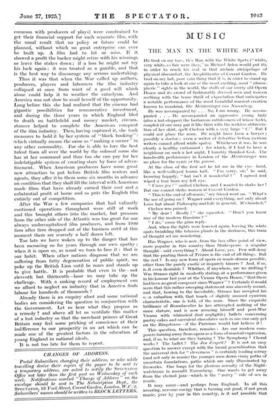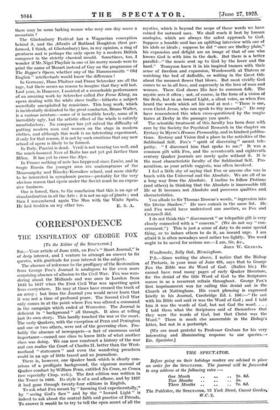MUSIC
THE MAN IN THE. WHITE SPATS
HE trod on my toes, th's Man with the White Spats (" white, very white, so fair were they,- as Michael Arlen would put it), in order to reach his seat in that archaic archipelago of physical discomfort, the Amphitheatre of Covent Garden. He trod on my hat, poor vain thing that it is, in order to stand up again to take a look at one of the most exciting, most " atmos- pheric " sights in the world, the stalls of our lovely old Opera House and its crowd of fashionably dressed men and women seething with the tense thrill of expectation that anticipates a notable performance of the most beautiful musical creation known to mankind, Die Meistersinger von Nuronkrg.
He was accompanied by . . . No, I am wrong. Ile accom- panied . . . He accompanied an aggressive young lady (also a hat-stepper) the barbarous ruthlessness of whose locks, coupled (if one may put it like this) with the reckless abbrevia- tion of her skirt, spelt Chelsea with a very large " C." But I could not place the man. He might have been a lawyer ; possibly a doctor ; even a writer of detective lietion (serious writers cannot afford white spats). Whichever it was, he was clearly a healthy enthusiast ; for which, if I had to have a neighbour on such a hot night, I humbly thanked God. The hundredth performance in London of the Meistersinger was no place for the cynic or the poseur.
At the close of the first act he hit me in the eye— hard, like a well-volleyed tennis ball. " I'm sorry, sir," he said, beaming happily, " but isn't it wonderful ? " I agreed and wiped a tear from my left eye.
" Vieux jeu ! " sniffed Chelsea, and I wanted to shake her I But one cannot shake women at Covent Garden.
" This is the end of all music," my friend went on. " What's the use of going on ? Wagner said everything, not only about Lave but about Philosophy and Life in general. It's finished."
Chelsea was pained.
" My dear ! Really I " she squealed. " Don't you know any of the modern Russians ? "
" I do," came the grim reply.
And, when the lights were lowered again, leaving the white spats twinkling like tobacco plants in the darkness, this train of thought set me wondering.
Has Wagner, who is now, from the box office point of view, more popular in this country than Shakespeare.— a singular thought—said everything ? About LoVe, yes. Few will deny that the panting throb of Tristan is the end of all things. But the rest ? Is any new form of opera or music-drama possible, other than the purely exotic or impurely bizarre ? And, if so, is it even desirable ? Whither, if anywhere, are we drifting ? Was Strauss right in modestly stating, at a performance given in his honour last year at the Vienna Opera House," that there had been no great composer since Wagner " ? Certainly it would seem that this rather sweeping statement was sincerely meant, and that, bowing to the inevitable, Strauss has accepted his own valuation with that touch of slightly amused cynicism characteristic, one is told, of the man. Since the exquisite brilliance of Rosenkavalier he has attempted nothing of the same stature, and is now amusing himself and post-War Vienna with whimsical (but negligible) ballets concerning pastry cakes and succulent chocolates such as one can only get on the Ringstrasse—if the Parisians would but believe it !
This question, therefore, remains : Are our modern com- posers turning away from opera as a form of musical expression, and, if so, to what are they turning ? The SyMphony ? Choral works ? The ballet ? The Jcu d'esprit ? It is not an easy question to answer except with the broad generalization that the universal itch for " cleverness " is certainly leading astray (and not only in music) the younger men down crazy paths of uncertain foundations, paths which are only illuminated by fireworks. One longs for the glorious serenity of the Night- watchman in moonlit Nuremberg. One wants to get away from the eternal jazz—which is the " nervy " side of sex in music.
It may come—and perhaps from England. In all this amazing, nervous energy that is turning out good, if not great music, year by year in this country, is it not possible that
there may be some lurking mouse who may one day move a mountain
The Glastonbury Festival has a Wagnerian conception behind it, and the Alkestis of Rutland Boughton (first per- formed, 1 think, at Glastonbury) has, in my opinion, a ring of greatness and is perhaps the only opera by a modern British composer in the strictly classical mould. Sometimes, too, I wonder if Mr. Nigel Playfair in one of his merry moods were to print the name of Mozart instead of Gay on the programme of The Beggar's Opera, whether any of the Hammersmith " Old English " intellectuals would know the difference !
In Germany, Hans Pfnitzer and Franz Schrecker are all the rage, but there seems no reason to imagine that they will last. Last year, in Hanover, I assisted at a remarkable performance of an amazing work by Schrecker called Der Ferree Kiang, an opera dealing with the white slave traffic—hitherto a subject mercifully unexploited by musicians. This long work, which is incidentally dedicated to the great conductor, Bruno Walter, is a curious mixture—some of it incredibly lovely, some of it incredibly ugly, but the artistic effect of the whole is entirely unsatisfactory. No composer has yet solved the difficulty of putting modern men and women on the stage in modern clothes, and although this work is an interesting experiment, if only for that reason, it is not by such creations that any new school of opera is likely to be formed.
In Italy, Puccini is dead. Verdi is not wearing too well, and the much-boomed Nero of Boito has not yet got farther than Milan. It has yet to cross the Alps.
In France nothing of note has happened since Louise, and in tragic Russia the younger men are contemptuous of the Mousourgsky and Rixnsky-Korsakov school, and seem chiefly to be interested in symphonic poems—probably for the very obvious reason that opera under the Soviet must be an expen- sive business.
One is forced, then, to the conclusion that this is an age of standardization in all the Arts : it is not an age of giants : and then I remembered again The Man with the White Spats.
He had trodden on my other toe. E. S. A.











































 Previous page
Previous page